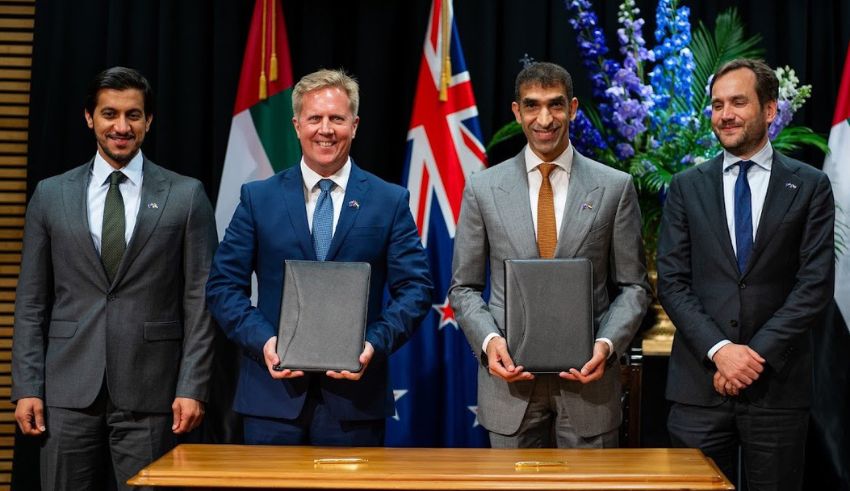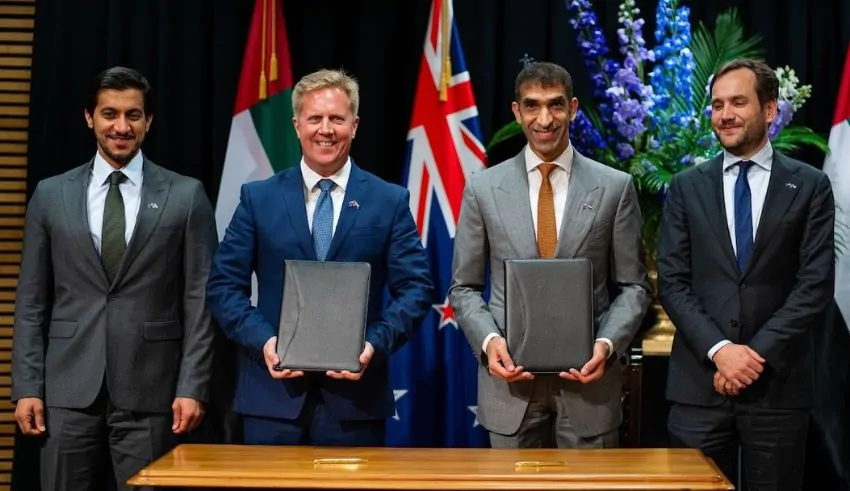

(C) Todd McClay/FB
Significantly boosting New Zealand’s foreign trade record, the coalition government has historically first negotiated its first free trade agreement (FTA) with the United Arab Emirates (UAE). Designed to give exporters from New Zealand historically unheard-of advantages, this premium agreement opens new markets and improves bilateral trade between the two countries. Under the agreement, practically all tariffs on exports to the UAE will be waived, therefore greatly increasing trade volumes and investment prospects in many different fields.
The effective end of negotiations inside a record-breaking four months emphasizes the significance both countries commit to boost their economic cooperation. Trade Minister Todd McClay said with much enthusiasm: “This is the fastest we have ever negotiated a deal in New Zealand, and it is one of the highest-quality on entrance into force.” His comments not only capture the speed of the negotiations but also the whole nature of the accord, therefore benefiting both nations greatly.
Rising to 99% after just three years, the new agreement will provide New Zealand exporters duty-free access to 98.5% of their goods arriving into the UAE. Driven by this significant lowering of trade restrictions, industries including food production, dairy, and agriculture should see explosive expansion. Under terms of this deal, the UAE—already a significant market for New Zealand products—especially dairy—will become considerably more important.
Celebrating this deal as a game-changer exporter would find is Executive director of the Dairy Companies Association Kimberly Crewther underlined on the significance of the UAE market for New Zealand’s dairy company: “In the last year, there’s been $700 million of dairy exports to the UAE—largely milk powder, but also some cheese, butter, and smaller volumes of other products”. Reducing tariffs will enable New Zealand’s dairy exports to the UAE to flourish, therefore generating new prospects for the agricultural industry to grow internationally. Given the UAE’s rising need for premium food items and its focus on food security, the agreement is particularly relevant; New Zealand is therefore most suited to assist.
Geopolitical researcher Geoffrey Miller, who foresaw fast growing trade between the two nations, also voiced hope about the long-term implications of the agreement. Miller said, “they’re already at $1 billion a year, which is no small change.” Particularly as New Zealand works to vary its commercial partners in the area, there is plenty of room for expansion.
Although the agreement with the UAE is a major victory on its own, it might also be a first step toward more general trade cooperation with the six Arab states forming the Gulf Cooperation Council (GCC). With so many chances for growth in sectors such technology, tourism, and agriculture, the GCC offers New Zealand a large and lucrative market.
Thani Bin Ahmed Al Zeyoudi, UAE Trade Minister, expressed hope the accord will motivate upcoming trade negotiations with other GCC nations. “We work on both tracks; often, the GCC track speeds up the minute we finish the bilateral.” Al Zeyoudi also added. He noted that the UAE’s arrangement with New Zealand might serve as a model for similar accords with other Gulf governments, therefore hastening the trend of the region toward more robust trade connections with Asia and the Pacific.
With this deal, New Zealand has a great chance to be more prominent in the Indo-Pacific area. New Zealand is ideally positioned in this strategic change as the Gulf states migrate eastward for commerce and investment. Therefore, not only a bilateral success but also the deal with the UAE marks the start of a fresh chapter of economic cooperation between New Zealand and the larger Middle East.
Notwithstanding the overall favorable reaction to the trade agreement, issues about UAE labor policies—especially with relation to migrant workers—have been raised. Claims of worker mistreatment—especially among low-skilled workers—have lately drawn condemnation of the UAE. But UAE Trade Minister Al Zeyoudi said labor rights were given great attention during the discussions.
Al Zeyoudi underlined that the emphasis was on attracting highly skilled people and encouraging technical innovation when questioned whether the trade treaty included provisions safeguarding workers’s rights. “Labor has been considered greatly throughout the negotiation; we are only focusing on the really gifted individuals,” he said. “We don’t focus on the blue collars or the low-skill laborers since the main intention of CEPAS and the free trade agreements is to ensure that we bring productivity and attention to advanced technology.”
Although this strategy complements UAE’s more ambitious economic objective toward a knowledge-based economy, in which innovation, productivity, and high-tech sectors occupy front stage, it would not immediately alleviate issues related to migrant worker treatment. Apart from agriculture, this concentration for New Zealand satisfies its own goals for exporting not only goods but also knowledge in fields such as technology, education, and sustainable development.
Stronger will to create lifetime ties between New Zealand and the UAE drives at the foundation of this trade agreement. “Not only has a friendship grown, but actually, the agreement is in the best interests of the people of both countries,” Trade Minister McClay said, underlining that the accord advances not just economic gains but also the best interests of the people of both nations. This strategy emphasizes the more general diplomatic objectives of the agreement, which seeks to enhance closer connections between the two countries in several fields, including trade and investment as well as cultural interaction and tourism.
One of the most famous cities in the United Arab Emirates, Dubai is already often visited by business and tourist New Zealanders. With the FTA in place, travel between the two nations is projected to rise, therefore deepening the links both personally and commercially already developed.
The success of this trade agreement has raised great expectations for next negotiations. The coalition government has shown that it can get a thorough, high-quality agreement in record time; this will most likely be a model for further trade negotiations with other countries.
Furthermore, as New Zealand keeps negotiating the complexity of world commerce, this agreement with the UAE marks a shift toward more solid strategic ties in the Indo-Pacific region and beyond. Particularly in sectors including education, technology, and agriculture, especially the future extension of the agreement to cover the whole GCC area would create even more chances for New Zealand exporters.
With this historic agreement, both nations should experience various advantages that would boost not only political and cultural collaboration but also economic growth. Since the coalition government signals a new phase in New Zealand’s international trade policy and prepares the stage for much more amazing future achievements, it has every motive to celebrate this important milestone.
Chinese President Xi Jinping landed in Cambodia on April 17 for a two-day state visit, marking the final stop of…
Finally, HBO is moving ahead with plans to create the Harry Potter TV series for air in 2026. Fans would…
The Philippine Basketball Association (PBA) has rescheduled its 2025 All-Star Weekend originally planned for May 2- May 4, 2025 in…
On Friday evening, the Memphis Grizzlies host the Dallas Mavericks for a decisive NBA Play-In Tournament game. Even though this…
Singaporean Nintendo fans, get ready! The highly awaited Nintendo Pop-Up Store is set to make its grand comeback to Jewel…
The UAE launched regional economic deals while building its Asia network. Vietnam signed its second Comprehensive Economic Partnership Agreement in…
This website uses cookies.
Read More